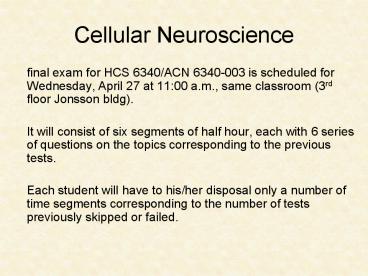Cellular Neuroscience - PowerPoint PPT Presentation
1 / 28
Title:
Cellular Neuroscience
Description:
Cellular Neuroscience ... It will consist of six segments of half hour, each with 6 series of questions on ... Each student will have to his/her disposal only ... – PowerPoint PPT presentation
Number of Views:196
Avg rating:3.0/5.0
Title: Cellular Neuroscience
1
Cellular Neuroscience
- final exam for HCS 6340/ACN 6340-003 is
scheduled for Wednesday, April 27 at 1100 a.m.,
same classroom (3rd floor Jonsson bldg). - It will consist of six segments of half hour,
each with 6 series of questions on the topics
corresponding to the previous tests. - Each student will have to his/her disposal only
a number of time segments corresponding to the
number of tests previously skipped or failed.
2
Cellular and molecular aspects of mental disease
3
- Alzheimer disease
- Psychosis and Schizophrenia
- Depression and mood disorders
4
Genetic factors are involved Several brain
systems are impaired at different stages
5
Neurofibrillary tangles are present in many brain
areas Including hippocampus, temporal lobe
6
Most drugs for Alzheimer Act to replace the lost
function Of the cholinergic basal
forebrain Effectivenes is modest and
only symptomatic
7
Senile plaque derives from the precipitation of
the cleavage product of proteins present in the
synapse (Abeta) or in the cell bodies (tau
protein in the fibrillary tangles)
8
One protein is particularly involved Amyloid
Precursor Protein (APP) Its function is
UNKNOWN It can be cleaved by alfa, beta or gamma
secretase Cleavage in alfa induces a soluble
segment, but cleavage in beta and gamma produces
an oligomer that 1) precipitates causing plaques,
2) is possibly directly toxic at the cellular
level
9
(No Transcript)
10
Psychosis and schizophrenia
11
Common disease of cognition originated in the
limbic system
12
Possible role of the amygdala as emotional gate,
similar to the role of thalamus for the sensory
systems
13
A complex circuitry is involved in the
development of auditory hallucinations which are
a ricurrent symptoms of the late stages of
schizophrenic psychosis
14
Dopamine antagonists are effective in a large
percentage of schizophrenic patients, suggesting
a dopamienrgic hyperactivity
15
Types of dopamine receptors
16
Most drugs given to alleviate psychosis are
similar to dopamine but they act in a way to
either block DA receptors or to increase its
clearance from the synaptic cleft
17
Structure of dopaminergic terminal
18
Possible sites of action of dopaminergic drugs
19
Positive and negative symptoms may be related to
the two main targets of the dopaminergic system
20
Depression and mood disorders
Monopolar disorder (depression) Bipolar Anxiety Ob
sessive compulsive disorder
21
Depression is associated with an impairement of
the serotoninergic system
22
Source and target of the 5HT system
23
Three type of drugs are effective in the cure of
depressive symptoms MAO inhibitors prevent the
lysis of 5HT in the cleft prolonging its
permanence Tricyclics monoamine 5HT re-uptake
inhibitors Selective 5HT re-uptake inhibitors
(like Prozac fluoexitine)
24
Target of the action of serotoninergic drugs and
neurotransmitters
25
Serotonin is not the only substance involved in
depression, for instance the circadian levels of
cortisol, the stress hormone produced in response
to hypotalamic factors, are typically higher in
depressed patients
26
Other mood disorders are related to impairment of
noradrenergic system. Source and target of the
noradrenergic system locus ceruleus and amygdala
27
Norepinephrine receptors Together with
acetylcholine are among the most important
regulators in the brain as well as in the
periphery
28
Target of the action of adrenergic drugs and
neurotransmitters































